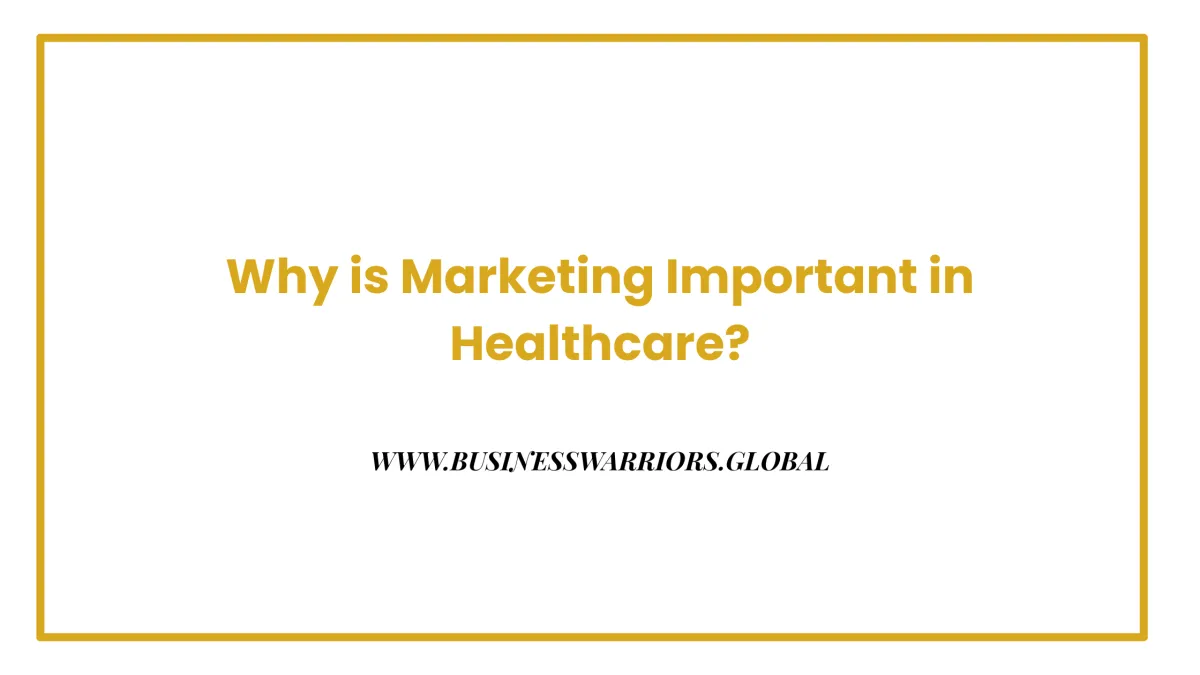
Why is Marketing Important in Healthcare?
Introduction to Healthcare
Healthcare is a complex and ever-evolving industry that plays a vital role in supporting the health and well-being of individuals and communities. The healthcare sector encompasses a wide range of healthcare organizations, including hospitals, medical practices, private practices, and healthcare systems, all dedicated to delivering essential health services and medical care to patients. In today’s digital age, the landscape of healthcare has shifted, making healthcare marketing an indispensable part of the healthcare industry.
Healthcare marketing important because it enables healthcare providers to attract new patients, retain existing ones, increase online visibility, and support compliance with legal regulations, especially as the industry undergoes digital transformation.
A successful healthcare marketing strategy is crucial for healthcare providers to stand out in a competitive market. Healthcare marketers must develop comprehensive marketing strategies that combine digital marketing, social media platforms, and traditional marketing methods to effectively reach their target audience. These marketing efforts are designed to engage prospective patients, retain existing patients, and connect with healthcare professionals, ensuring that every segment of the target audience receives relevant and timely information.
Healthcare marketing aims to educate patients, promote health services, and foster trust and loyalty between healthcare organizations and their communities. By leveraging digital platforms such as search engines and social media, healthcare providers can boost their online visibility, drive more traffic to their healthcare website, and attract new patients. Effective healthcare marketing also helps organizations build a strong brand presence, improve their search engine rankings, and stay ahead in the rapidly changing healthcare sector.
In the digital age, healthcare consumers are increasingly turning to search engines and social media platforms to find healthcare information, research healthcare providers, and compare medical services. This shift in consumer behavior means that healthcare organizations must prioritize their online presence and invest in digital marketing strategies like search engine optimization (SEO) and content marketing. These marketing techniques help healthcare organizations reach more patients, enhance their reputation, and provide valuable health information to those seeking care.
Ultimately, healthcare marketing is a critical component of the healthcare industry. It empowers healthcare organizations to connect with their target audience, promote their services, and build lasting relationships with patients. By embracing digital marketing strategies and maintaining a strong online presence, healthcare providers can attract new patients, retain current ones, and contribute to better patient outcomes in an increasingly digital world.
Introduction to Health Care Marketing
Healthcare marketing is important because it helps providers attract new patients, retain existing ones, and communicate vital health information. Healthcare marketing is crucial for healthcare organizations to attract and retain patients in the digital age – it involves promoting health services and building a strong brand presence. Consistent messaging across all channels helps establish trust and improve recognition for healthcare organizations.
Effective healthcare marketing strategies combine digital marketing and traditional marketing methods to reach a wider audience.
Healthcare marketing aims to educate patients and provide them with valuable insights about healthcare services and medical care.
A well-planned healthcare marketing strategy is essential for healthcare providers to stay competitive in the healthcare industry.
Importance of Effective Healthcare Marketing
Healthcare marketing is important because it helps healthcare organizations reach potential patients and increase patient acquisition. Effective marketing techniques are essential for engaging patients and standing out from competitors within healthcare marketing strategies.
It enables healthcare providers to build a strong online presence and improve their search engine rankings. Patients seek healthcare providers by researching online reviews and reputation, making it crucial for organizations to manage their digital presence.
Healthcare marketing also helps to establish a healthcare organization as a thought leader in the healthcare sector.
By leveraging digital marketing strategies, healthcare marketers can target specific audiences and provide them with relevant health information. Understanding consumer behavior allows healthcare marketers to tailor personalized marketing strategies that resonate with patients at different stages of their healthcare journey.
Healthcare Services and Marketing
Healthcare services marketing involves promoting medical services and health care to potential patients.
Healthcare marketing strategies should focus on patient education and providing valuable insights about health services. Additionally, healthcare marketing helps inform the public about health issues and manages patient expectations regarding their health concerns.
Digital platforms, such as social media and search engines, are essential tools for reaching and engaging patients, allowing healthcare organizations to promote their services more effectively.
Healthcare organizations should prioritize building a strong brand presence and establishing trust with their patients. Understanding a patient's stage in their healthcare journey allows organizations to tailor their marketing efforts, enhancing patient engagement and experience.
Healthcare Systems
Healthcare systems are intricate networks that bring together healthcare providers, organizations, and a wide range of medical services to deliver comprehensive care to communities. In such a competitive and rapidly evolving environment, effective healthcare marketing is essential for healthcare systems to thrive. A robust healthcare marketing strategy enables these systems to connect with potential patients, foster strong partnerships with healthcare providers, and clearly communicate the value of their services.
By implementing targeted marketing strategies, healthcare systems can increase patient acquisition and retention, ensuring a steady flow of new and returning patients. Digital marketing plays a pivotal role in this process, allowing healthcare systems to enhance their online presence through search engine optimization and strategic use of digital platforms. These efforts not only improve visibility in search engine results but also help build a trustworthy brand reputation.
Moreover, healthcare marketing empowers healthcare systems to educate patients, promote new treatments, and highlight specialized services, making it easier for patients to make informed decisions about their care. By leveraging digital marketing strategies, healthcare systems can reach a broader audience, streamline communication, and ultimately drive sustainable growth in an increasingly competitive healthcare landscape.
Digital Marketing in Healthcare
Digital healthcare marketing is a modern, internet-based approach that tracks patient engagement, improves communication, and enhances patient outcomes by mapping the patient journey and leveraging digital channels for targeted interactions.
Digital marketing is essential for healthcare organizations to reach potential patients and promote their services. A responsive website and effective digital marketing efforts are crucial for engaging and retaining the potential patient by providing an optimal user experience that encourages them to choose your services.
Search engine optimization (SEO) is a critical component of digital marketing in healthcare, as it helps healthcare organizations improve their search engine rankings. Digital marketing strategies can be tailored to help a healthcare practice grow its online presence and attract more patients.
Healthcare marketers should leverage social media platforms to engage with patients and provide them with relevant health information. It is important to comply with healthcare regulations, such as HIPAA, when engaging with patients online.
Digital marketing strategies, such as content marketing and marketing automation, can help healthcare organizations streamline their marketing efforts. Developing detailed, content-rich pages targeting treatments and conditions can improve search rankings and increase patient leads for a medical practice. Digital marketing initiatives are increasingly replacing traditional methods to improve patient access, enhance campaign performance, and achieve higher ROI.
Healthcare Marketing Strategy
A healthcare marketing strategy should be tailored to the specific needs and goals of a healthcare organization. A comprehensive healthcare marketing strategy should include well-designed marketing campaigns aimed at patient engagement, retention, and acquisition.
It should involve a combination of digital marketing and traditional marketing methods to reach a wider audience, including prospective patients and new patients through personalized outreach and digital channels.
Healthcare marketers should focus on building a strong brand presence and establishing trust with their patients. Marketing campaigns can be tailored to attract new patients and engage existing patients, helping to retain current patients and improve patient retention through targeted communication and loyalty programs.
Strategies should be adapted for different types of organizations, including healthcare practices, medical practices, private practices, and medical providers, to ensure effective outreach and growth. Marketing strategies should also consider the broader context of health systems and their role in patient decision-making.
A well-planned healthcare marketing strategy can help healthcare organizations attract and retain patients, and ultimately drive sustainable growth. Ethical considerations, including regulatory restrictions and sensitive health communications, must also be addressed when developing a healthcare marketing strategy.
Effective Marketing in Healthcare
Effective marketing in healthcare goes beyond simply promoting services—it requires a comprehensive understanding of the healthcare industry, its unique regulations, and the evolving needs of healthcare consumers. Healthcare marketers must craft marketing strategies that are both patient-centric and data-driven, ensuring that every marketing campaign resonates with the target audience and complies with industry standards.
A successful healthcare marketing campaign leverages a mix of digital platforms and traditional marketing methods to reach patients where they are most active. Personalization is key: marketing efforts should be tailored to educate patients, build trust, and foster long-term loyalty. By utilizing marketing automation tools, healthcare organizations can streamline their outreach, deliver consistent messaging, and efficiently measure the impact of their campaigns.
Staying ahead in the healthcare sector also means embracing the latest trends in digital marketing, such as artificial intelligence, content marketing, and advanced analytics. These innovations enable healthcare marketers to gain valuable insights into patient behavior, optimize their marketing strategies, and achieve sustainable growth. Ultimately, a holistic approach to marketing in healthcare not only enhances patient outcomes and satisfaction but also positions healthcare organizations as leaders in a dynamic and competitive industry.
Healthcare Advertising
Healthcare advertising is a vital part of any healthcare marketing strategy, allowing healthcare organizations to effectively reach and engage potential patients.
In today’s digital age, healthcare advertising has expanded beyond traditional marketing methods to include a wide range of digital marketing strategies, such as search engine optimization (SEO), social media advertising, and targeted digital ads.
Healthcare marketers use these marketing channels to boost brand awareness, drive more traffic to their healthcare website, and generate qualified leads for health services.
Effective healthcare advertising not only promotes medical services but also aims to educate patients about available healthcare information, preventive care options, and the benefits of choosing a particular healthcare provider.
By leveraging digital marketing platforms and search engines, healthcare providers can connect with a broader audience, build trust, and position their healthcare organization as a reliable source of health information.
Strategic healthcare advertising helps healthcare organizations stand out in a competitive healthcare landscape, ensuring their marketing efforts reach the right target audience at the right time.
Benefits of Healthcare Marketing
The benefits of healthcare marketing include increased patient acquisition and retention, improved patient satisfaction, and enhanced brand reputation. Building patient loyalty is also a key benefit, as it encourages repeat visits and referrals.
Healthcare marketing can also help healthcare organizations establish themselves as thought leaders in the healthcare sector.
By leveraging digital marketing strategies, healthcare marketers can provide patients with valuable insights and education about health services.
Effective healthcare marketing can also help healthcare organizations improve their search engine rankings and increase their online visibility. This, in turn, helps organizations attract more patients and grow their practice.
Health Marketing and Patient Engagement
Health marketing involves promoting health services and medical care to potential patients.
Patient engagement is critical to effective healthcare marketing, as it helps build trust and establish a strong brand presence. Health marketing also supports public health initiatives by promoting health awareness and education.
Healthcare marketers should leverage digital marketing strategies, such as social media and content marketing, to engage with patients and provide them with relevant health information. Additionally, targeting healthcare professionals is important to expand outreach and improve patient care.
Patient education and feedback are essential components of health marketing and patient engagement.
Patient Engagement
Patient engagement is at the heart of effective healthcare marketing, serving as a cornerstone for building lasting relationships between healthcare organizations and their patients. In today’s digital age, patients seek healthcare information and services online, making it essential for healthcare providers to adopt marketing strategies that foster ongoing communication and trust. By leveraging digital marketing channels such as social media platforms, email campaigns, and educational content, healthcare organizations can connect with potential patients and nurture loyalty among existing ones.
A strong online presence, supported by a well-optimized healthcare website and robust search engine optimization, ensures that patients can easily find and interact with healthcare providers. As patients increasingly turn to search engines to research health services and medical care, healthcare marketing aims to educate patients, manage expectations, and deliver valuable healthcare information at every stage of the healthcare journey.
Effective healthcare marketing strategies prioritize patient engagement by offering personalized interactions and timely communication. Initiatives such as patient feedback surveys, interactive content marketing, and targeted messaging on digital platforms help healthcare organizations understand patient needs and preferences. This not only enhances patient satisfaction but also drives patient retention and encourages positive word-of-mouth referrals—key factors for sustainable growth in the competitive healthcare landscape.
Healthcare providers who invest in patient engagement benefit from improved patient loyalty, higher retention rates, and a stronger brand presence. By consistently educating patients and responding to their feedback, healthcare organizations can demonstrate their commitment to quality care and build credibility within the healthcare industry. Moreover, these marketing efforts are cost-effective, as retaining current patients is often more efficient than acquiring new ones.
In summary, patient engagement is a vital component of healthcare marketing. By utilizing digital marketing strategies, optimizing marketing channels, and focusing on the needs of patients, healthcare organizations can achieve greater patient satisfaction, loyalty, and long-term success. Prioritizing patient engagement not only benefits patients but also positions healthcare providers for sustainable growth and a leading reputation in the healthcare sector.
Digital Marketing Strategies
Digital marketing strategies, such as SEO and social media marketing, are essential for healthcare organizations to reach potential patients.
Healthcare marketers should focus on building a strong online presence and improving their search engine rankings.
Content marketing and marketing automation can help healthcare organizations streamline their marketing efforts and provide patients with valuable insights.
Digital marketing strategies can help healthcare organizations attract and retain patients, and ultimately drive sustainable growth.
Measuring Success
Measuring the success of healthcare marketing efforts is critical to making data-driven decisions.
Healthcare marketers should track key metrics, such as website traffic and social media engagement, to evaluate the effectiveness of their marketing strategies.
Patient feedback and satisfaction surveys can provide valuable insights into the success of healthcare marketing efforts.
Healthcare organizations should prioritize continuous evaluation and improvement of their marketing strategies.
Future of Healthcare
The future of healthcare marketing involves leveraging digital marketing strategies to reach potential patients and promote health services.
Healthcare marketers should focus on building a strong online presence and improving their search engine rankings.
Patient education and engagement will become increasingly important in the future of healthcare marketing.
Healthcare organizations should prioritize staying up-to-date with the latest digital marketing trends and technologies.
Conclusion
Healthcare marketing is essential for healthcare organizations to attract and retain patients in the digital age.
A well-planned healthcare marketing strategy can help healthcare organizations establish themselves as thought leaders in the healthcare sector.
Digital marketing strategies, such as SEO and social media marketing, are critical to effective healthcare marketing.
Healthcare organizations should prioritize building a strong brand presence, establishing trust with their patients, and providing valuable insights and education about health services.




